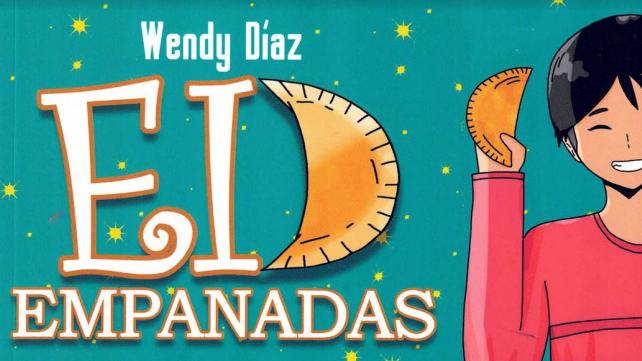
Schools of all kinds should be welcoming places. A community of children from families that are similar and different, all celebrated for their uniqueness and potential. When that is not the case, children feel the effects deeply. Author Wendy Díaz shines a spotlight on these kinds of challenges in her latest book Eid Empanadas.
Omar Hernandez is a 4th grade student at An Noor Islamic Academy. When he transitioned to the school two years ago he wasn’t quite sure what to expect. He had been comfortable in his public school where many of the kids looked like him and were also native Spanish speakers. But the older he got the more challenging it was to practice Islam in that environment. His Mami and Papi encouraged the change and have always been supportive. Still he “didn’t feel Latino enough outside of his Islamic school yet did not feel Muslim enough in school because of his background.”
Ramadan was just around the corner and everyone was excited. His teacher Mrs. Khan had students share what they loved most and everyone chimed in about their favorite foods and family traditions. There was talk of Morracan lanterns, Turkish pre-dawn sahoor favorites, Arabian dates, Indian rose-flavored milk, Senegalese aunties cooking, and Egyptian dinner parties. Everything “sounding so wonderfully foreign!”
Omar loved this time of the year, too. What wasn’t to love? Mami pulled out all the stops in the kitchen - arroz con pollo (rice with chicken), rellenos de papa (stuffed potato balls), tostones (fried plantains), and so much more! There would be decorations, frequent trips to the masjid, and gifts on Eid!
Omar was keenly aware of how different (Mami called it “unique”) his family was. Both his parents were converts, his mother from Puerto Rico and his father from Ecuador. Not only was his Latino culture different but he didn’t have long-standing traditions surrounding the Islamic holidays. When his classmates talked about big family feasts, special holiday treats, and clothing sent from back home for Eid, it made the differences between them wider still. How was he going to explain what was special about his family celebration in his essay and to his class? What if they ridiculed him for having non-Muslim family members? About his “traditional” foods? Find out how Eid empanadas open the door for more than just a delicious Latin American treat!
Eid Empanadas is a great read during Ramadan or Eid but is relatable to any situation where a child feels left out or different. With Omar’s feelings always front and center, it can be an effective conversation starter and assist in problem-solving on a variety of topics. The chapter book is a nice independent read for elementary students or a read-aloud choice for bedtime. As an added bonus, the book cover and inside illustrations were penned by Diaz’s son Uthman Guadalupe, making this book truly a family affair!
Like many of her previous works, Wendy Díaz shares the beauty of her Puerto Rican roots, her passionate practice of Islam, and the challenges she faced as a convert and with racism in the Muslim community. She uses colorful Spanish vocabulary throughout (and encourages readers to learn them!), adds a glossary of Islamic terms, and even shares a family recipe for empanadillas. She also relates how she used food, and most particularly these tasty appetizers, in her words “a Spanish version of samosas,” to bridge a divide and teach Muslims about her Puerto Rican heritage. This last point is especially poignant for the Muslim community in North America where Latinos make up the largest number of new converts to Islam. We should all listen and learn.
For more information, check out other articles by and about Díaz’s work to highlight Latino culture and identify resources for Latino families.
https://www.soundvision.com/article/hablamos-islam-we-speak-islam
https://www.soundvision.com/article/bringing-voice-to-a-life-s-journey-to-islam
https://www.soundvision.com/article/finding-islamic-books-for-and-with-latino-children
Zahirah Lynn Eppard is the managing editor of the Muslim Home parenting newsletter project. As Sound Vision’s Director of Religious Education, she has also spearheaded the production of more than 400 online classes serving children ages 3-12 in the Adam’s World and Colors of Islam Clubs. Eppard has also worked in the field of education as a teacher, homeschooler, and Islamic school principal, as a marital and crisis intervention counselor, and as a lobbyist, and social justice activist. She lives with her husband and six children in Maryland.



Add new comment